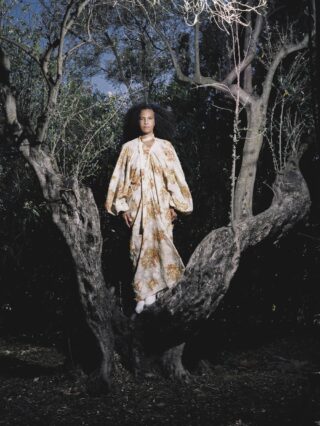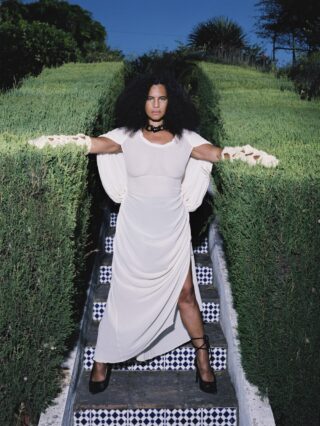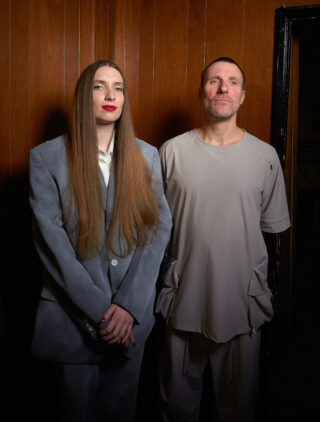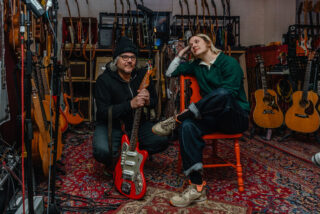Jessica Wrigglesworth: I’ve been listening loads to The Versions – they’re so good! Are you excited for everyone to hear them?
Neneh Cherry: They’re like gifts! Each one is a different present. For me it was about the actual women, asking the different people that I love, and of course just wanting them to do it because of who they are. Then hearing what they’ve done, it’s just mind-blowing.
JW: It must be so special hearing these things that you put out in the world coming back to you in a different form. When did you first have the idea?
NC: When the Raw Like Sushi reissue came out [in 2020], we – me, Cameron, and Robin [Pasricha, Cherry’s manager] – were thinking, “What else would be a fun, creative thing to do, rather than a so-called greatest hits record?” I’ve always loved remixes and the idea of re-doing things, so I guess the first idea was like, getting one song re-done. I think the first thing that came up was ‘Buffalo Stance’ and that maybe Robyn would do it and from there it was like a penny dropped. I’ve said a million times I’m kind of allergic to nostalgia. There’s a room where if you stay in it too long, it can almost start to feel a bit karaoke, you’re just re-using old matter because you can. I can never quite get my head around the fact that even now younger generations would say, “Oh, ‘Buffalo Stance’ is a really cool tune”. I’m always like, “Oh, wow, really?” So I think there’s also been a focus with the whole project to work with the new crew that are out there.
JW: Did the list of artists come together organically? Did you already know that you wanted it to be all women when you started or did that just happen?
NC: I think that that was one of the definite threads, to make it a female-identifying, women-led project, it felt right. And then we just made a wish list, and sent it out to the allocated creatures in the universe. Pretty much everybody, which I couldn’t really believe, wanted to do it.
JW: Were there any tracks that particularly surprised you when they came back, or made you see the song in a different light?
NC: ANOHNI’s version of ‘Woman’, to me, was how I’ve always dreamt that the song should be. There’s an aspect of it that I find quite… maybe slightly pompous? And I’ve always had a bit of a battle with it, and when I’ve done it live, I’ve tried to reinvent it, or break it down and make it a bit more rugged. And ANOHNI’s version has that, it’s got more kind of Nina Simone blood and guts. And I love Seinabo [Sey]’s ‘Kisses on the Wind’.
I think actually it’s the songs that maybe I didn’t like so much at the time that surprised me most. I had a bit of a weird relationship with ‘Kisses on the Wind’ because I never thought it should be a single and in America, it became a single because the label wanted more pop hits. In Europe, we put out ‘Manchild’ which was like the perfect kind of contradicting balance to ‘Buffalo Stance’. It’s not that I don’t like ‘Kisses on the Wind’ but I never quite believed it at the time as a single, it always felt like a bit of a sell-out. So I think Seinabo’s reinvention makes it a much more interesting and kind of deeper song in a way, maybe because it was a bit more throwaway.
But also I like Greentea Peng’s ‘Buddy X’! and ‘Sassy’! Tyson’s ‘Sassy’. Sia doing ‘Manchild’, Kelsey Lu, Jamila Woods, Honey Dijon, Sudan Archives. It sounds stupid, but actually, each one of them and I think a really cool part of the whole journey is that each one has come at different times. It wasn’t like, “Here you go, this is the full package” – they’ve all just kind of plopped in.
JW: What was your relationship with the artists when they were doing the covers, were people in touch with you about it? Or did you leave them to it and just wait for the tracks to arrive in your inbox?
NC: I had some conversations, not many. And I didn’t really want to, the point wasn’t that I should influence them in any way. Robyn had some questions about ‘Buffalo Stance.’ I love her because she’s absolutely from the heart, and there’s always an injection of her full self inside her songs which to me is why she’s a great songwriter.
Within that, there’s also a lot of thought, so she needed to talk through certain things. The same thing with ANOHNI. My only real instruction was just to do with it as you feel – you don’t owe it anything, if you just wanted to use one word, or half a sentence that’s fine. Because that’s the magic of music, we all interpret and hear things differently depending on what our life story is; a tune might represent a place you’ve been, or something that you’re thinking about. So I wanted to leave it open, a blank sheet.
JW: Has it led to any further collaborations, are you writing any new stuff at the moment?
NC: I haven’t started writing new stuff yet, but this has also been really inspiring, so I feel ready to go. If I look at the whole of The Versions, I feel like I’ve reconnected to the songs, and also that I’ve reconnected or connected with each of the individual women, in a very special way. I’ve thought a lot about seeing everybody individually, and it could be fun to get everybody together, to gather the whole posse and do something. But I think [The Versions] pulls at some very beautiful threads internally for me, in a [particular] time in my life. I mean, by no means do I feel like I’m done, but also, I can’t deny it, I’ve passed through a lot of things. It would be weird if I didn’t sit back and reflect on a certain amount of that journey, and where it’s taken me and what that means, so I think it’s a really great time to harness, to pull these things in and have something like this happen. It brings new life to it, it kind of brings [the music] out in front rather than behind.









